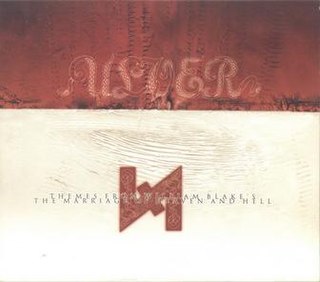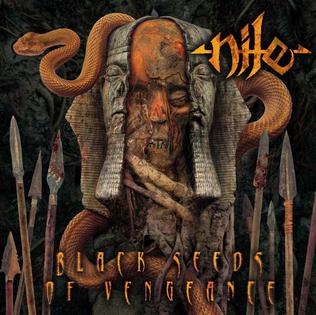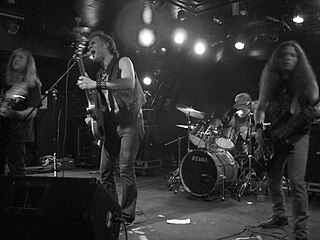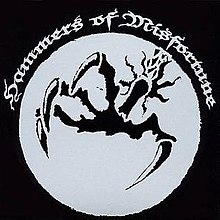
Cradle of Filth are an English extreme metal band formed in Suffolk in 1991. The band's musical style evolved initially from black metal to a cleaner and more "produced" amalgam of gothic metal, symphonic metal and other metal subgenres. Their lyrical themes and imagery are heavily influenced by Gothic literature, poetry, mythology and horror films. The band consists of its founding member, vocalist Dani Filth, drummer Martin 'Marthus' Škaroupka, bassist Daniel Firth, guitarists Marek 'Ashok' Šmerda and Donny Burbage, and keyboardist Zoe Marie Federoff.

Fantômas is an American heavy metal supergroup formed in 1998 in California. It features vocalist Mike Patton, drummer Dave Lombardo (ex-Slayer), guitarist Buzz Osborne (Melvins) and bassist Trevor Dunn. The band is named after Fantômas, a supervillain featured in a series of crime novels popular in France before World War I and in film, most notably in the '60s French movie series.

Blue Murder were an English rock band led by guitarist-vocalist John Sykes. The group was formed in 1987 following Sykes's dismissal from Whitesnake. The initial line-up was rounded out by bassist Tony Franklin and drummer Carmine Appice. In its nascent stage, vocalist Ray Gillen and drummer Cozy Powell were attached to the project. In 1989, Blue Murder released their self-titled debut album, which cracked the Billboard 200 chart and spawned a minor hit with "Jelly Roll". By the early 1990s, however, Blue Murder's music had fallen out of fashion with the popularity of grunge. Franklin and Appice left the band, while Sykes put together a new line-up and released Nothin' But Trouble in 1993. After a live album the following year, Blue Murder were dropped by their record label and broke-up. Since then there have been numerous attempts to reunite the band to no avail.

My Favourite Headache is the debut solo album by Geddy Lee of Canadian rock band Rush. The album was released on November 14, 2000, by Anthem Records in Canada and Atlantic Records outside of Canada. Both the title track and "Grace to Grace" received play on mainstream rock radio, and the album itself peaked at No. 52 on the Billboard 200.

Themes from William Blake's The Marriage of Heaven and Hell is the fourth studio album by Norwegian experimental electronica band Ulver. Produced with Kristoffer Rygg, together with Knut Magne Valle and Tore Ylwizaker, it was issued on 17 December 1998 via Jester Records. It is a musical adaptation of William Blake's poem The Marriage of Heaven and Hell. The album blends electronics, industrial music elements, progressive metal, avant-garde rock and ambient passages, following Blake's plates as track indexes. Stine Grytøyr, Ihsahn, Samoth and Fenriz all feature as guest vocalists.

Black Seeds of Vengeance is the second album by American technical death metal band Nile, released on September 5, 2000 through Relapse Records. It was the first album in Nile's discography to mark a more complex musical direction, as well as feature extensive liner notes in the booklet, written by Karl Sanders to explain the concept and themes behind each song. It also was the band's first album recorded with vocalist/guitarist Dallas Toler-Wade, and features Derek Roddy as a session drummer, temporarily replacing previous drummer Pete Hammoura who left the band due to injuries sustained while touring. Bassist Chief Spires left shortly after touring for the album.

"State of the World" is a song recorded by American singer Janet Jackson for her fourth studio album, Janet Jackson's Rhythm Nation 1814 (1989). It was written and produced by Jimmy Jam and Terry Lewis, with additional writing by Jackson. While recording the album, Jackson and the producers watched television, especially news channels, and created the song inspired by that. "State of the World" focuses lyrically on homeless people. It was released as the eighth and final single from the album on February 6, 1991, by A&M Records.

Ludicra is an American heavy metal band from San Francisco. They originally formed in 1998 as a quartet and later expanded to five members. In 2011, the band announced on their official website that they had disbanded, but they reunited in 2022.

Slough Feg is an American heavy metal band from Pennsylvania, formed in 1990 and currently based in the San Francisco Bay Area. Taking their name from the Celtic folklore-influenced comic book Sláine, the band released their self-titled debut album in 1996. Slough Feg combines influences from traditional heavy metal bands such as Iron Maiden, Brocas Helm, and Thin Lizzy, as well as English folk metal band Skyclad.

Strong Enough is the second studio album by American country music band Blackhawk, released in 1995. It features the singles "I'm Not Strong Enough to Say No", "Like There Ain't No Yesterday", "Almost a Memory Now", "Big Guitar", and "King of the World", which respectively reached numbers 2, 3, 11, 17, and 49 on the Hot Country Songs charts. The album itself earned RIAA gold certification for sales of 500,000 copies.
While Heaven Wept was an American epic doom metal band based in Dale City, Virginia. The primary writer and overall engine of the band was mainman Tom Phillips. Their melodic, classically influenced style could be compared to bands such as Solitude Aeturnus and Solstice ; however, 2003's acclaimed Of Empires Forlorn saw the band branching out into a variety of metal and progressive styles. This trend continues on their 2009 album, Vast Oceans Lachrymose, and on their 2011 album, Fear of Infinity.
Hammers of Misfortune is an American heavy metal band from San Francisco, California. The band's style has varied from album to album, at times incorporating different elements of folk metal, doom metal, NWOBHM, black metal, 1970s rock, and thrash metal. It is the brainchild of guitarist John Cobbett, who serves as the band's producer and primary songwriter.
Steel Prophet is an American power metal band led by the founder and main writer Steve Kachinsky.

The Locust Years is the third studio album by the progressive metal band Hammers of Misfortune. The album was issued in 2006 and reissued in 2010 by Metal Blade Records.

Fields/Church of Broken Glass is the fourth studio album by the progressive metal band Hammers of Misfortune, released in 2008. It consists of two concept albums of smaller length, Fields and Church of Broken Glass. The band has commented that the album is "a split with (their)selves".

The Bastard is the first album by the American progressive/heavy metal band Hammers of Misfortune, released in 2001.

17th Street is the fifth studio album by heavy metal band Hammers of Misfortune. It was released in 2011 on Metal Blade Records.

Michael Scalzi is an American musician and a philosophy professor at Diablo Valley College. He is the frontman for the heavy metal band Slough Feg.

Underworld is the ninth studio album by American progressive metal band Symphony X. It was released on July 24, 2015 through Nuclear Blast, and released in Japan on August 24. The album's first single, "Nevermore", premiered on May 22, 2015, followed by "Without You" on June 19. They were both officially released on July 22, 2015. The band's guitarist, founder and main songwriter, Michael Romeo, said he was against releasing separated tracks of the album, since it was written to be "a whole".

The Holographic Principle is the seventh studio album by the Dutch symphonic metal band Epica, released on 30 September 2016. The album was produced by Joost van den Broek and mixed by Jacob Hansen. The release date along with the album's title and cover was revealed on Epica's website on 3 June 2016, the tracklisting was revealed on 17 June 2016.

















